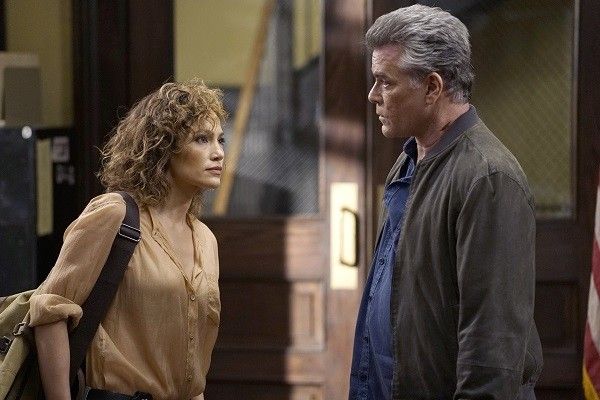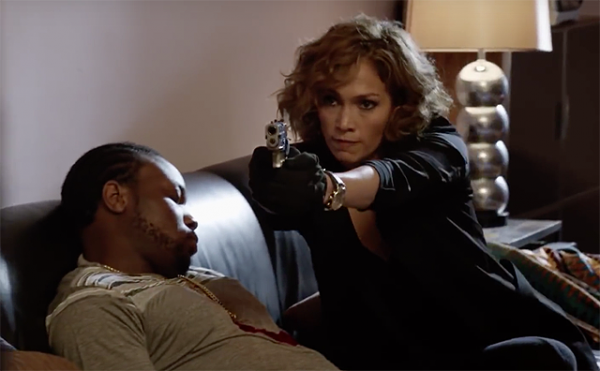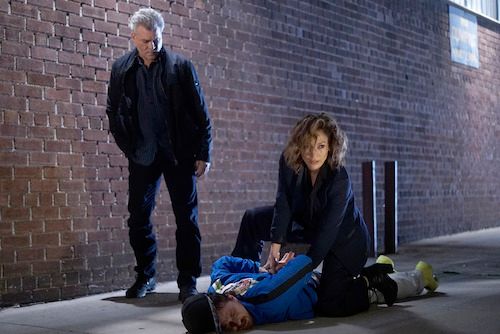Is Shades of Blue on Hulu or Netflix
'Shades of Blue' Review: Jennifer Lopez Adds Meager Spark to NBC Cop Drama
The manipulative stress of a season-long arc once again stalls out a familiar, if vaguely promising premise and reliable performers like Ray Liotta and Lopez in NBC's latest dirty-cop drama set in New York City.
Despite the various reports that she's a nightmare on set, as well as the slew of less-than-memorable choices as a musician and actress, Jennifer Lopez undeniably has charisma. When the right director gets ahold of her, such as in Steven Soderbergh's groovy crime drama Out of Sight or Oliver Stone's nasty neo-noir U-Turn , she emanates a potent confidence that often translates to a hypnotic, convincing sense of experience in her characters. Even when the material has been less-than-ideal - Parker , The Boy Next Door , etc. - she can be naturally seductive and holds the screen with something like poise, which is not a talent that should be simply shrugged off.

It's what makes the recent downward trajectory of her career so genuinely unfortunate, and I'm afraid Shades of Blue , NBC's latest take on the NYC-based cop drama which stars Lopez alongside Ray Liotta, does not signal anything like a change of course. Opening with what would seem to be a climactic laptop-recorded confession of unspeakable crimes, the series immediately teases a climax that, in the narrative, is a few weeks off, suggesting that we will only truly understand the depths of Lopez' Detective Harlee Santos' corruption toward the very end of the season. The writers quickly make it clear that Santos and Liotta's Wozniak are the leaders of a small team, includingVincent Laresca's Espada and Drea De Matteo's Nezario, which collects protection and shakedown money, while also managing the drug trade in New York City by working with selected, cooperating dealers.
They're all dirty cops, but the show stresses that Wozniak is somehow the only truly corrupted one, as the opening flicker of a confession already gives a sense that Lopez's character's guilt is beginning to turn her away from the payoffs that help her give the best for her daughter, Cristina (Sarah Jeffery). The revelation that the FBI, embodied by Warren Kole's Stahl, has been watching her and are poised to turn her into an informant provides the all-important rub, but the show is only passingly interested in the details of such situations. More than the technical and lawful nuances that go into community-based payoffs, or even the reasoning behind Wozniak and Santos' work with drug dealers, the series is interested in the familial vibe that exists within the corrupt unit, lending the group an easy, uncomplicated morality that the show builds up. The FBI, in contrast, are treated as clinical and emotionless, righteous in their actions but without the warmth and loyalty that has kept Wozniak and Santos so close over the years.

Even in the opening salvo, in which Santos helps cover up the unlawful shooting of a Black man by her newbie partner, Loman ( Dayo Okeniyi), the narrative is written to show that Santos is more protecting a scared, young policeman than covering up a cold, unthinking murder. And what's worse, this sequence openly suggests that loud video games and the victim's possible involvement in drug dealing have as much to do with his murder as the young man who put two bullets in him and the senior officer who lies regularly to excuse her partner's actions. There's no horror to the scene, no sense of how deeply depraved such an act truly is, but rather, just how much skill and knowledge it takes to set up such a crime scene to look like a shoot-out rather than an unintended execution. In contrast, when Wozniak sends a young dealer to his death for what he perceives as the common good, director Barry Levinson makes it clear through music and the dealer's pleading that what Liotta's character is doing is a heinous, callous crime of false righteousness, unlike Santos and Loman's staging.
This hugely irresponsible attitude strikes me as a product of the show's clear focus on its larger, season-long arc and obvious tactics of cliffhanging and foreshadowing, thinking less of how these scenarios would really feel like in the moment and more about how they fit into the story in the grand scheme of things. This has similarly been a problem for the repugnant Chicago P.D. and a number of other cop dramas that use the plague of police corruption as an easy hook and never feel the need to really address the inherent issues of such violence and abuse of the law. If a series like Shades of Blue were to actually show an interest in how such corruption works, the long-term effects of their actions and the political pressure that often underlie them, Lopez, Liotta, and the rest of the talented cast might have something a bit more challenging and evocative to tangle with in their performances. Unfortunately, the truth of the matter is that Shades of Blue has no shading in character or story, and is more interested in reiterating transposed views of family values than dealing with the tough and often very ugly subject matter it purports to confront.
★★ Fair — Only for the dedicated
Shades of Blue premieres Thursday, January 7th at 9 p.m. on NBC, and airs regularly afterwards on Thursdays.

Source: https://collider.com/shades-of-blue-review-jennifer-lopez-ray-liotta-nbc/



0 Response to "Is Shades of Blue on Hulu or Netflix"
Post a Comment